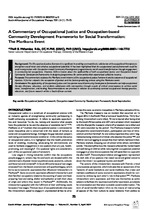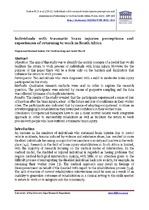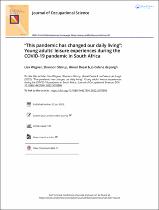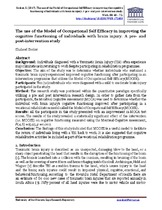A Commentary of occupational justice and occupation-based community development frameworks for social transformation: The Marikana event
Abstract
Background: The Occupational justice framework is significant in enabling communities to collaborate with occupational therapists to strengthen social vision and enhance occupational potential. It has been highlighted that the occupational justice framework could be used in conjunction with Occupation-based Community Development programmes to enrich social transformation through engagement in community-led occupations. However, little is known about the applicability of both occupational justice and Occupation-based Community Development frameworks in designing programmes for communities that experienced collective trauma. Purpose: This commentary explores the Marikana event in terms of the occupational justice framework and its outcomes of occupational injustice. It further unpacks the occupation of protest and the factors predicting protest using the Marikana event. Conclusion: The applicability of Occupational Justice and Occupation-based Community Development frameworks can help occupational therapy clinicians, educators, and students collaborate with communities through a cycle of critical consciousness to achieve social vision, transformation, and healing. Recommendations are provided in relation to community-centred occupational therapy practice, education, and future research within a South African context.
(PDF) A Commentary of Occupational Justice and Occupation-based Community Development Frameworks for Social Transformation: The Marikana Event. Available from: https://www.researchgate.net/publication/350810812_A_Commentary_of_Occupational_Justice_and_Occupation-based_Community_Development_Frameworks_for_Social_Transformation_The_Marikana_Event [accessed Sep 20 2021].
Collections
Related items
Showing items related by title, author, creator and subject.
-
Individuals with traumatic brain injuries perceptions and experiences of returning to work in South Africa
Soeker, Mogammad Shaheed; Van Rensburg, Viki; Travill, Andre L. (IOS Press, 2012)Objective: The aim of this study was to identify the central concepts of a model that would facilitate the return to work process of individuals with brain injury. However for the purpose of this paper there will be a focus ... -
“This pandemic has changed our daily living”: Young adults’ leisure experiences during the COVID-19 pandemic in South Africa
Wegner, Lisa; Stirrup, Shannon; Desai, Himali; De Jongh, Jo-Celene (Journal of Occupational Science, 2022)The COVID-19 pandemic is a global human ecosystem disruption affecting almost every facet of daily living. South Africa adopted a risk-adjusted approach comprising five-levels to curb the spread of COVID-19. Early in 2020, ... -
The use of the Model of Occupational Self Efficacy in improving the cognitive functioning of individuals with brain injury: A pre- and post-intervention study
Soeker, Shaheed (IOS Press, 2017)BACKGROUND: Individuals diagnosed with a Traumatic Brain Injury (TBI) often experience major limitations in returning to work despite participating in rehabilitation programmes. OBJECTIVE: The aim of the study was to ...




